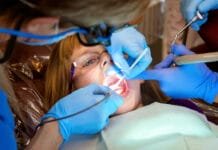Selecting a place of employment is a huge decision. Dental hygienists spend a significant portion of their lives at work, so it’s important to find an office that is a good fit. There is an inherent risk in accepting a new position because we often leave our current office behind when we start, and we are counting on the new employer to be a better match than the last.
Dental hygienists are in demand and are often offered positions by multiple employers. Some hygienists opt to work at multiple offices and can accept more than one employment offer. In my experience, most offices don’t mind having a part-time employee work at another office, but make sure to verify this when you interview.
However, for full-time positions, accepting one offer means turning down another opportunity. It is important to properly evaluate each office so we accept the best offer and don’t let a better opportunity pass us by.
Evaluating Dental Hygiene Employers
How should we evaluate potential employers? Most dental offices are small businesses, so we can’t always look at websites such as Glassdoor. Below are seven tips for evaluating a dental office.
1) Check the dental licenses of the providers in the office
State dental board websites have licensee look-up systems where anyone can verify a license and check for any disciplinary action taken on a provider’s license. This could alert you to potential red flags, including malpractice, criminal activity, or unprofessional conduct.
2) Consult your network of dental professionals
Even in a big city, dentistry can be a small world. There’s a chance you know someone who once worked for this employer. While you might not want to alert your current coworkers that you are job searching, try reaching out to some other dental contacts to see what they know about the potential office. Do the employees generally get along with one another? Does the dentist do quality restorative work? Is the hygiene schedule consistently full? If your contact has positive things to say about the office, you might even be able to have this person put in a good word for you.
3) View their social media posts
You can tell a lot about an office from its social media presence. If it looks like a consistent group of people through the months and years, that’s a sign of low turnover.
Group outings can help keep morale high. Birthday gifts and messages can indicate that the employer is thoughtful and appreciative. Scroll through the posts to get an idea of what the office is like on a personal level.
If an office only posts about professional matters, you can still get a sense of the office’s recent procedures. For example, before and after photos are a great way to see the dentists’ work.
4) The office’s website
An office’s website should inform you of its collective treatment philosophy. Often, offices will highlight their specialties and any advanced equipment they use.
There’s usually a list of staff, and sometimes they’ll even show how long their employees have been with this office. This is another resource to screen for high employee turnover. If there isn’t information about the employees on the office’s website, this could be a sign that the employees aren’t regarded as a valuable part of the practice.
Also, a substandard website could indicate a lack of professionalism. An ideal office would have great attention to detail and care about how its website is presented to patients.
5) Read online reviews
Now, it’s time to look at the office from the patient’s point of view. Do patients feel valued and well cared for? Do they feel like they’re being rushed through their treatment? Remember, one bad review doesn’t mean it’s not a good office. Read many of the reviews and see if there’s a recurring theme.
As a bonus, potential employers might be impressed when you tell them you read their reviews and looked at their website. It shows that you’re serious about the position.
6) Google
One time, I googled a dentist before an interview and got an interesting result. A court document said his wife was divorcing him for having an affair with his office manager. This made me feel uncomfortable because the dentist and office manager sounded unprofessional, and there seemed to be some drama at that office. Googling an office is a quick way to check for any scandalous news articles or court cases.
It is also helpful to Google information about the neighborhood of the prospective dental office. Crime statistics could help identify any potential safety concerns. If the office doesn’t provide parking, it is worthwhile to scope out the availability of nearby parking options.
The location of an office and the demographic of people in that area can also be an indicator of economic growth or loss for the office. For example, I know several dental offices right next to the campuses of big tech companies in my city. As more people started working from home, these offices started losing a lot of patients. Now, with large rounds of layoffs, even more patients are leaving the area. A neighborhood’s economic uptick or downturn can affect the stability of our jobs, so these factors should be considered.
7) Working interviews
A working interview is the last step when doing your due diligence on a new office. Working interviews allow you to check the quality of the instruments, the pace of the schedule, and the staff’s interactions, for example. Did the office set an acceptable wage for the working interview? Did they pay you promptly and pay you as an employee, not an independent contractor? How does the office handle patients who arrive 10, 15, or 20 minutes late? Is the office’s dental software fairly intuitive, or does it present some challenges?
Sometimes, employers extend a job offer without a working interview, but I highly recommend working there for at least a day. Getting a feel for the office before committing to working there is crucial for long-term success.
In Closing
With the current high demand for dental hygienists, we have an opportunity to be a little pickier about the positions we accept. It’s standard for employers to check the background of potential employees. Why shouldn’t job seekers do the same thing to potential employers? Make sure you do your homework before committing to an office. A little due diligence now could save you a lot of unpleasantness later.
Before you leave, check out the Today’s RDH self-study CE courses. All courses are peer-reviewed and non-sponsored to focus solely on pure education. Click here now.
Listen to the Today’s RDH Dental Hygiene Podcast Below:












